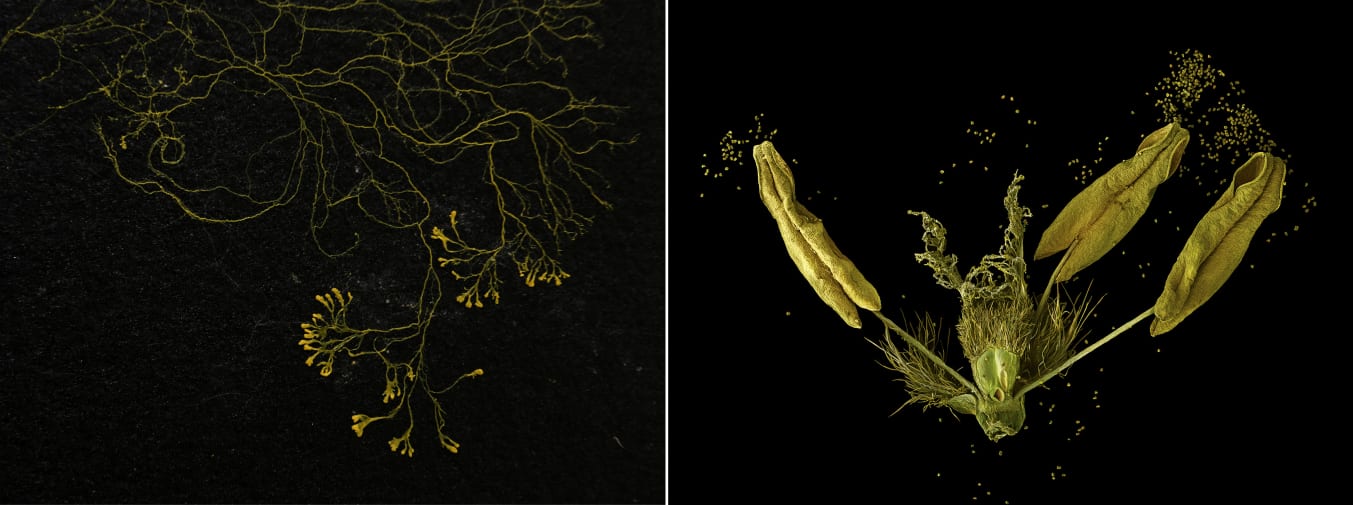Living Systems Lab Research Group
About our group
As a research and knowledge exchange group we situate our practice in the context of the planetary boundaries and ethics of care. Our research inquiries are centred on learning from complex, interconnected and dynamic living systems to inform the production of new knowledge in the fields of arts and design. We position our practices as a means to grow and nurture a flourishing multi-species world.
Keywords
Living Systems, Biodiversity, Planetary Boundaries, Ecosystems Functions, Biodesign, Bioart, Regenerative design, Flourishing, Multi-Species, Interspecies, Interconnected, One Health, Biocomputation, Ethics of Care, Emergence, Networks.
Our research group was established in 2013 and has since grown, bringing together researchers from diverse disciplines - artist, architect, designer, environmental scientist, sociologist, bioengineer, biologist - and PhD students committed to learn with and from living systems to advance creative, cultural and ecological knowledge.
As a group, we operate like a slime mould, a collective of individual cells. We come together to produce shared outputs such as conferences and exhibitions, but we also lead our own inquiries as individual researchers within the Living Systems Lab. Our research operates in hybrid spaces between the studio, the laboratory and the field.
We produce practice-based research, curation, exhibitions, conferences and publications at international level. We regularly collaborate with academic and cultural organisations, universities and research groups to exchange and learn with our academic peers and biocentric communities. See Research and Knowledge exchange for more info.
Research in the curriculum
Our research work has led to the development of new pedagogies centred on living systems principles, with the validation of new courses such as MA Biodesign (2019) and MA Regenerative Design (2022 – via Maison/0) and the delivery of novel learning opportunities in, with and for nature including site-responsive residencies and co-enquiry methodologies.
See Research in the curriculum for more info.
We have an active research group with both part-time and full-time PhD students.
Grow Lab
We initiated the creation of the Grow Lab at Central Saint Martins in 2019, a specialist hybrid biolab space dedicated to connecting biological tools in the support of art and design practices.
Eco-centric schools of thoughts
Why should we learn with/from living systems?
Why should creative practices nurture the living world?
In the context of our planetary emergency, we recognise the need to redefine our practices in a way that emulates how life works: in interconnected, dynamic, multi-model systems that are conducive to supporting the complexities of life. Learning from how living systems work through observation, intervention and active multi-species collaboration we become students of Nature and explore new ways of making and framing human knowledge.
From a scientific perspective
Living systems are the most sophisticated, most complex and most efficient form of matter existing on planet earth. We are fascinated in how multi-scalar, multi-species and multi-dimensional systems of ‘life’ co-exist in harmonious equilibrium. Additionally, we are as intrigued when these systems fall out of balance, and approach unknown territories of no return. Our objective is to observe and analyse biodynamic processes to facilitate the implementation of regenerative systems into healthcare, environmental and design applications. We collaborate with living systems and ethically debate their use as planetary fixers.
From a regenerative and biodesign perspective
The intersection of life sciences and design informs the development of new nature-positive practices. By researching and referencing modes of biofabrication found in nature, we can incorporate biological principles (cyclical, solar, local) into the design process and explore new materials and forms of production for the future. With biodesign practice, research methodologies can be radically altered by the notion of working with dynamic living systems as opposed to inanimate matter and designers have begun to expand their roles, from scripting the form-shaping of materials, to creating and growing new biological materialities. The lab explores alternative bio-informed design protocols which navigate the realm of the hand-made, the man-made and the ‘grow-made’ as an inquiry into future making.
With regenerative design we explore how to integrate ecosystems functions and living systems principles in our practice to adopt a holistic approach to the restoration of biodiversity, climate, and social justice.
From an artistic perspective
We explore the interrelationships between artistic research and living systems, developing novel encounters, interfaces and artworks that investigate the underlying mechanisms of natural phenomena, challenge species hierarchies, question our relationship with nonhuman entities and examine the scalar relationships between biological, technological and social systems. Within the broad fields of bioart and ecological art the lab supports practice-led artistic research working with living systems as material, model and metaphor, also connecting with practices of new media, participatory art and public realm research. Questions of authorship, ethics and co-creation are investigated, and hybrid methodologies - combining artistic, philosophical and biological approaches - are nurtured through creative and critical frameworks.
From a multi-species perspective
Humans have radically disrupted natural habitats and the planetary geological forces by endorsing an extractivist and exploitative worldview that is threatening our climate and the survival of many species, including our own. What becomes of creative practices when we adopt other species perspectives? How can we restore the healthy dynamics of ecosystems via our practices? How can we activate a new multi-species worldview? These are questions we explore through our research, knowledge exchange and teaching.

